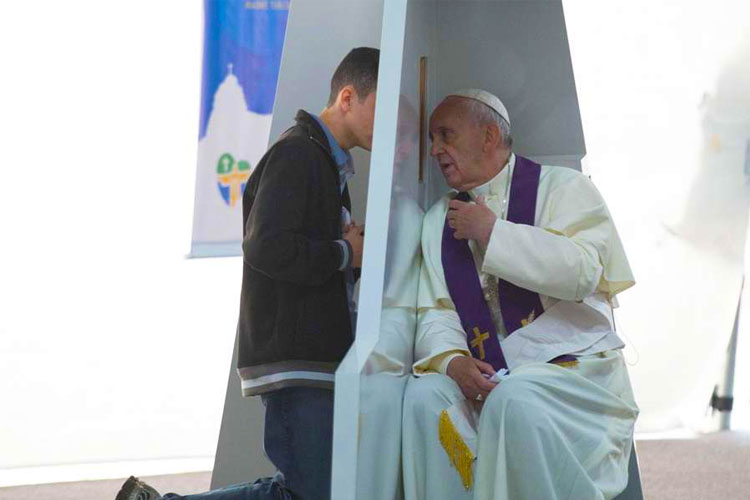When we strive to have a mystical encounter with God in prayer, there is one particular blockage that is particularly hard to overcome. This blockage is sin. It blinds us to the truth and clouds our perception of God. God is aware of our need for constant help against this and one of the greatest gifts he has given to us is the sacrament of reconciliation. In this article, we examine the many ways regular confession can transform your life and experience of prayer.
The sacrament of reconciliation is one of the greatest gifts God has given us to help in our journey through life. The graces that we receive through this sacrament are so potent they literally restore us to a state of sinlessness. In the pursuit of coming to know God, we will fall regularly and often. This is nothing to be ashamed of; it is our present nature that will only be completely overcome when we achieve union with God in heaven.
This said, we are not called to remain fallen. While both Judas and St. Peter denied and betrayed Christ, there is a reason we still celebrate Peter as a great Christian. St Peter chose to face this failing, come back to Christ and ask for forgiveness. It was because of this that he went on to do such great deeds and become a saint.
The same is true for us. If we choose to come back to God even when we fall, we will gradually break the shackles that our different sins place upon us. As a result, we will be able to pray more and more in a state of grace.
Why should we aim to pray in a state of grace?
A state of grace removes the fog of sin from our communion with God. Perception of, and reception to, God’s presence, grace and will is unhindered by the greatest hindrance. Inner peace and inner silence can be manifested with far greater ease. When effort is taken to attain all these, we achieve a foretaste of heaven and come to know God in the most profound way possible for us here on earth.
Why we should continue to pray even when we have sinned
While awesome, staying in a state of grace for any length of time is extremely difficult as, like mentioned before, our present nature does not naturally adhere to this. A common mistake we can then often fall into is that prayer outside a state of grace is pointless and shouldn’t be attempted. This is not true and prayer at all stages of our life is beneficial to our spiritual wellbeing.
When we commit lesser sins, praying after sinning is similar to running with a bag on your back and every time you sin a brick is placed within the said bag. While the effort is harder than before, it’s still doable and the more practiced we become at prayer, the more even in times of sin we will be able to reach out to God and respond to his call.
It’s important at this point to make a distinction between venal (lesser) and mortal (deadly) sins. Venal sins wound our relationship with God whereas mortal sins break this relationship.
What this means is that mortal sin adds an additional difficulty to our prayer life. Once committed, it deafens us to God. Even so, we should still pray in this situation as God has not abandoned us. He will still respond even if we will find it difficult to perceive or notice him. This is because God initiates all prayer and never stops reaching out to us, even when we have spiritually blinded ourselves to him. When we pray in this state, we still open ourselves to his grace even when we will not be able to perceive its effects fully in our lives.
Of course, in either case we want to receive the grace of reconciliation as soon as possible, but it’s important we don’t despair for essentially just being human.
Where can I receive the sacrament of reconciliation on a regular basis
The sacrament of reconciliation should normally be available in your parish at least once a week, normally on a Saturday. Additionally, most cathedrals will have very regular opportunities for confession. If you head to Westminster Cathedral, there is an opportunity for confession almost every day of the year with at least one of the confessionals manned throughout most the day.
